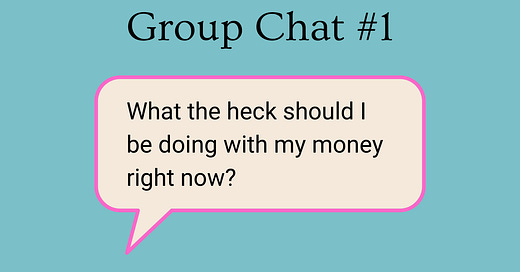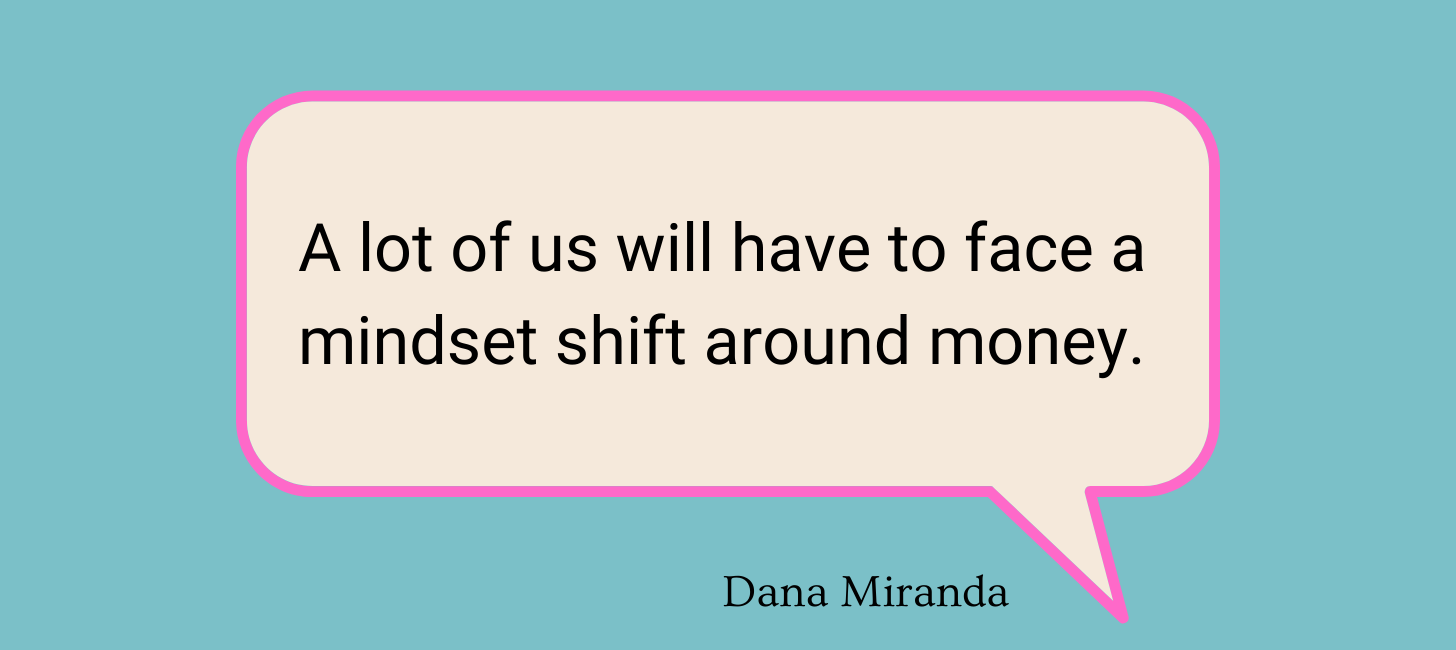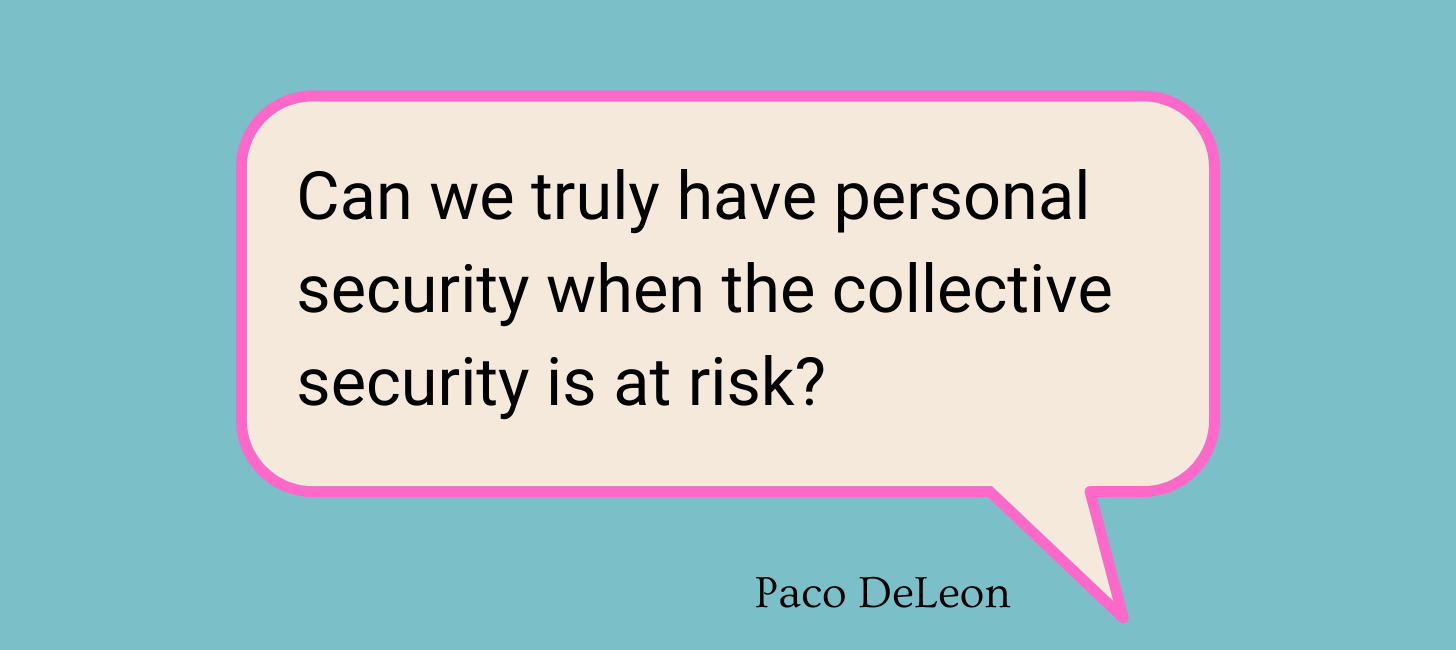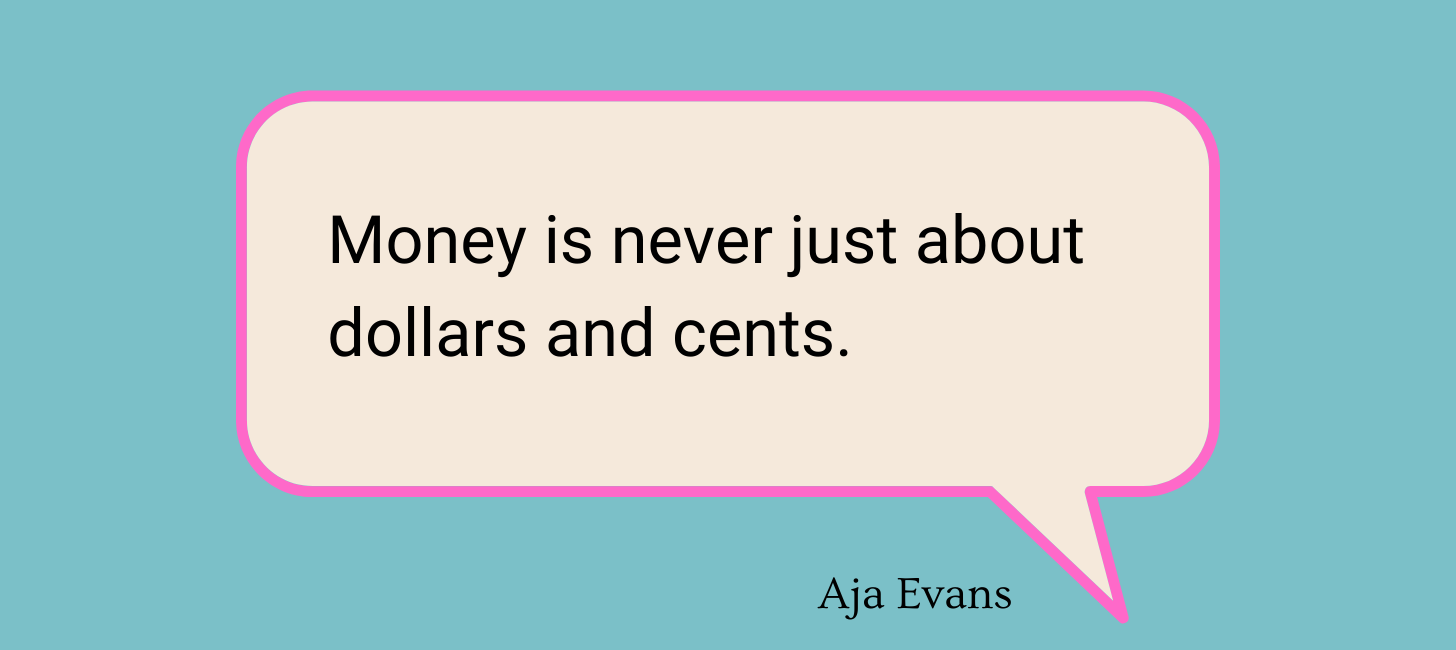Group Chat No. 1: What the heck should I be doing with my money right now?
4 financial experts weigh in on how to manage your finances during a new presidential administration
Before I kick off our new series Group Chat, just a reminder that Erika and I will be hosting a casual coffee hang tomorrow morning at ByClio in Gowanus. RSVP here if you want to join!
I think I have mostly lived in a place of denial since last year’s presidential election. I woke up the morning after Election Day feeling that sharp pang of deep disappointment many of us know well, wrote a newsletter in response to that heartache, and then pretty much went back to my life.
What else can I do? I definitely wish that more than half the country had voted for my candidate, but sadly we don’t always get what we want. And so I guess I decided that day that I just wasn’t going to think about it for a while.
But here we are 77 days later, and we have a new old president, and part of me wonders if I should start to worry about it. Some of you might be reading this feeling a lot of frustration and anger toward me, but I do know how much privilege I have as a straight white woman with means. I do not take those facts for granted, and it is from this point of privilege that I want to make sure I make smart moves over the next four years—not just for myself but for the community we’re building at The Purse. I don’t think it helps anyone, especially myself, if I am freaking out on a regular basis about all the noise that this administration tends to create.1
Of course, I’m also not planning to totally stick my head in the sand and ignore the world around me. Far from it. I feel motivated right now, and perhaps more confident than I have in a while. Now is not the time to second-guess our skills or diminish our light. Now is the time for us to focus on ourselves and our projects. We need to invest in each other and our communities. We need to support companies that support us, and we need to be smart about what we’re doing with our money. Because the truth is, money matters.
In this first edition of Group Chat, I started out with a really big question: What the heck are we supposed to do with our money during the next presidential administration? I reached out to four friends in the personal finance space—Michelle Teheux of
, of , Paco de Leon of The Hell Yeah Group, and Aja Evans, LMHC, financial therapist—to get their best advice.2None of them have advice on how to ensure your investment portfolio grows despite stock market volatility or how to navigate changes to the tax code, but what they share is vital nonetheless. You’ll see some themes repeated throughout all four entries: curb risk, save more, spend intentionally, and invest in community. These money moves might not make us as monetarily wealthy as those running Washington, but we should not underestimate our collective power.
Wow, I’ve really climbed up on my high horse for this first Group Chat. But I really do feel fired up! Instead of wringing our hands, let’s do something! And let’s start by being thoughtful about our finances!
I’ll let the experts take it from here.
Michelle Teheux
I assume we will see major changes thanks to two primary factors: dramatic political upheavals and significant AI-associated job disappearances.
I recommend each of us take an inventory of what we have coming up in the next few years:
Do you want to start a family, buy a house, invest, retire? Do you have family members with needs to consider? If you’re married, is your partnership strong?
Does your job feel secure? What skills do you have that you could use for a career pivot if you had to? Do these skills lend themselves to starting a business or side gig? What related skill(s) could you pick up that might help?
How’s your community? I’m talking about community in the largest sense—everything from the state of your local food pantry to your best friends you keep saying you’re going to see when you have time.
Here’s what I’m doing in my situation, which is a late-50s married writer with two grown kids: I am trying to find new income sources. I’ve done very well on Medium, but I’m not sure that platform is going to survive, so I’m devoting more time to Substack and other opportunities. I hope to get an agent and traditionally publish my next book, although I can also publish and market it myself if I need to.
For me, this is a time for caution. I’m much better at saving money than making it. Although I have very little invested, I also have low living expenses and could weather a certain amount of catastrophe. My mortgage balance is so low I could pay it off today if I chose, and we drive two long-paid-for cars. We have a decent emergency fund thanks to a viral story that’s still paying off! We don’t have any credit card debt. My husband’s job seems stable. If I felt more optimistic about the next few years, I’d buy a newer car right now, but I’ve decided to wait and see.
I’m asking myself, “What preparation would I wish I’d made if X happened?” If your ducks are wandering around, get them in a row!
As for my community, I’m involved in a county political group that aims to add more progressive people to local ballots, and I volunteer for a child literacy organization, Altrusa. I’m also trying really hard to be a little less of a homebody and see my friends more. If really bad times hit—and they can hit any of us, as we just witnessed with so many wealthy people losing their homes in the inferno in Los Angeles—you will be glad to have a strong community to stand with.
Michelle Teheux writes the newsletter and is the author of the book The Trailer Park Rules.
Dana Miranda
The overarching theme around money in the final Trump term will be uncertainty. Neither candidate nor President Trump have historically been consistent in policy positions or reliably followed through on promises. On top of that, Congress is almost at a standstill with such a tight Republican majority, and the majority is further divided between traditional and MAGA factions.
This all means many of the most extreme ideas we heard from the campaign and Project 2025—like eliminating the Department of Education or deporting tens of millions of people—are unlikely to happen as promised because they require buy-in from too many people who don’t agree on much. That’s kind of good news? But it also means the administration will probably come up with plenty of other half-baked ideas to overstimulate us over the next four years, and we’ll have to stay at least a little tuned in to know what’s likely to impact our personal financial situations.
A lot of us will have to face a mindset shift around money. Transitioning to independent work like freelancing could help bolster you against the whims of an erratic economy. Living more frugally or being more mindful of your spending might be necessary to absorb costs like moving to a more affirming community or paying higher health insurance premiums. Spending more on travel might become a priority for folks who need a break from this country.
If you make changes to how you manage money, it requires some work, like regular check-ins, communication, and negotiation among family members—and with yourself—to keep your priorities and plans straight. Be prepared for those conversations, so you’re not caught off guard by feelings that spring up around financial uncertainty.
A lot of people have questions about investment decisions. Potential good news for folks saving for retirement: The overall market forecast was largely unchanged by Trump’s election, and continued growth is expected. Keep your long-term savings diversified (like in index funds) to protect from forecasted volatility in some sectors.
In anticipation of rising consumer prices, folks with the resources might want to make major purchases, like new appliances, vehicles, electronics, or home renovations, now to save from potentially higher costs later. (If you don’t comfortably have the resources now, this advice isn’t useful for you! Don’t panic about making it happen.)
Federal student loans remain a huge question mark, leaving millions of Americans in financial limbo. Trump isn’t likely to continue Biden’s fights for student debt relief, so if your loans are in forbearance because of pending court action, plan for payments to resume at the end of the year once Biden’s efforts are dropped or stopped in court.
The one place Trump has historically followed through was in tax cuts. The changes passed in 2017 are set to expire this year, but experts expect lawmakers to extend and maybe even expand them (to the detriment of social services). For most of us, that means no changes. If you earn more than $400,000 a year, you may enjoy even bigger tax breaks in the near future, and in that case, you should work with an accountant on a plan for potential effects in 2026.
is creator of and author of the new book You Don’t Need a Budget. Dana is hosting a free webinar on this topic on Wednesday, January 29, at 4:00 p.m. ET. You can register here.
Paco DeLeon
For a handful of years, I worked at a financial planning and wealth management firm. We never helped clients plan their finances around a new presidential administration, per se. What we did do is follow the tax laws that might be changing so we could help our clients understand and navigate them.
For example, the law dictating a lower inheritance tax rate is sunsetting soon, which means these taxes might jump from 15% to 50%. In that example, some older clients with significant assets (we’re talking tens of millions) might want to start giving away more of their assets and money to their heirs or through charitable donations so their estate won’t have to pay so much. While this isn’t the most noble thing I’ve ever participated in, it’s the truth and the reality of the tax code and how lawmakers’ decisions impact folks.
Not everyone is in this fortunate situation where they have so much that they need to follow tax laws closely to preserve their already-large pile of money. For most people, what they do with their finances during the new administration will likely be what they’ve always done. The fundamentals still hold true regardless of who is in office. These fundamentals are: earn money, spend less than you earn, and invest and save the difference. Rinse and repeat.
But you’re asking me this question at an interesting inflection point in my life and career. When I first started working, inequality was bad, but it’s clearly gotten much worse over the years. Companies have merged and consolidated to become more powerful; we’ve got more billionaires; and many people are worried about their jobs because of AI.
I could be wrong, but I think the heart of the question is more about dealing with a level of uncertainty many of us have never ever seen or lived through. I think the question might also be about how to manage our risk in the face of it all. How do we protect what we have from the ultrarich who are now trying to become even richer by manipulating our government?
The question you’re asking has forced me to really confront the difficulty of how to protect personal financial security when the collective security is so deeply threatened. Maybe this is too philosophical of a question to ask, but it’s one I’m asking: Can we truly have personal security when the collective security is at risk? I don’t have an answer, but I know I’m changing my behavior, and here’s how. And I think it answers your question.
I’m monitoring my cash flow. If you’re feeling uncertain, you might want to have a little bit more cash on hand, and one way to do that is to be resourceful, thoughtful, and intentional with your spending.
I’m trying very hard to divert spending away from places like Amazon and boycott really big companies that don’t align with my values. Jeff doesn’t need my money—my local community does. While this might run counter to spending less, it’s an investment in local vendors. Remember what Walmart did to small towns? Big conglomerates and Big Tech are now doing that to the rest of the world.
I am doubling down in how I’m investing in my community. This might not seem like a financial decision on its face, but it is. During uncertain and unstable times, we will need to rely on each other and help each other, whether that’s through mutual aid, lending someone something, picking them up from the airport, or watching their kid.
Paco DeLeon is founder of The Hell Yeah Group and the author of Finance for the People. You should definitely sign up for her newsletter, The Nerdletter.
Aja Evans
It is impossible to ignore the toll of political and economic volatility. Money is never just about dollars and cents; it’s intertwined with our sense of security, values, and well-being. If you find yourself struggling with what to do next, I hope these steps provide a hint of calm and guidance.
If you hear my voice at any moment in your time of need, I hope you hear this: Do not move any of your money when you are upset, scared, angry, anxious, etc. None! In those moments when you are searching for quick relief, the solution is not in draining your accounts, liquidating your retirement, or fleeing the country. (Or all three!) While I completely understand these instincts, that kind of relief will most likely only be short-term. I would prefer you have a clear mind and complete understanding of what you truly want before making any big financial moves. You’ll find more relief in talking to a friend, laughing, crying, exercising, and screaming into the void about how messed up this is. There’s also relief in community.
Do not move your money until your nervous system is regulated.
If you find yourself doom-scrolling, obsessing over news headlines, or feeling paralyzed about your financial decisions, you are not alone. The Trump administration’s proposed economic policies—tax reforms, threats to the Affordable Care Act, and potential trade wars—have created uncertainty for individuals and families across the socioeconomic spectrum. We are all feeling it. In an effort to mitigate your concerns, get specific about your needs. Are you anxious about women’s rights, job security, or the state of your retirement accounts when you don’t have long before you leave the workforce? Understanding your values and identifying your boundaries gives you a guideline for how to prepare.
Align your finances with your boundaries. Now is a great time to make sure your emergency fund is stocked—having some liquidity will be helpful if you need to make well-thought-out changes. This may not be something that happens this week, but it can be something you work towards. While there is a level of privilege in having the ability to do something drastic, I do believe in people utilizing their resources to do what they need to do.
Know your money. Cultivate habits that support both financial and emotional well-being. Regularly reviewing your financial plan and goals, checking in with an advisor, or automating savings are all helpful practices during times of uncertainty. Remember, political administrations come and go, but your financial and emotional resilience will carry you through. By focusing on what matters most—your values, goals, and mental health—you can navigate uncertainty with greater confidence and clarity, even if it doesn’t feel like it. This is the time to take care of yourself.
Lastly, get support. Do not bury your feelings—share them. Seek out people who you feel comfortable sharing your inner thoughts and feelings with. Be honest with yourself about how hard it is to know what the right decision is, and journal about it. Ask for help when you need it.
I wish I had a crystal ball to tell us how we will all be impacted by the next four years. I hope you get the support you need to weather this storm with people who love you and can hold space for all the feels that come up. I truly believe we are stronger together and will be taking a more micro approach to getting through whatever comes our way.
Aja Evans is a board-certified therapist who focuses on personal finance. She’s the author of the new(ish) book Feel Good Finance.
How do you plan to manage your money during these uncertain times? Share in the comments!
Random Extras:
There’s just a week left in January, which means there’s just a week left to take our survey and get an additional 10 entries into our sweepstakes.
I’m looking to relaunch Saturday Spend this weekend! But we need more entries! It’s the low-lift social-first sister of Home Economics! Fill out the form here.
All of the women featured here today have written some really amazing books. The Purse gets a tiny commission if you happen to purchase one through our links. (Though I’d also recommend picking them up from your local library!) We’ve also rounded up some of our favorite personal finance, career, and culture-of-money books on Bookshop.org. Check them out here.
Erika and I are in the midst of planning some very exciting events, and paid subscribers get first dibs on tickets (at a discount). How about upgrading to paid or sharing this edition with a friend?
Gotta be honest, there was a much angrier draft of this newsletter. Ultimately, I decided that calling people names is unproductive. I don’t like it when people who don’t agree with my POV make fun of me and my community (or worse), and so I’ve decided going forward, I’m going to live by the Golden Rule, at least in this newsletter. I won’t promise I won’t be ranting and raving to Ken behind the scenes. Sorry, Ken.
While I deeply respect all the women quoted here today, I should note that you shouldn’t make any financial moves without first speaking with an expert and doing your own research.











Loved Paco’s question and response. More of this 💛💛💛💛
Brilliant idea, Lyndsey. I feel like my group chats are saturated with different tones of despair and fear. There’s also a lot of “what do we do!!?” a question addressed to
both personal and professional realms. It’s nice to see some community here with ideas in direct response to that question. I love all aspects of The Purse, but this one is a new favorite.